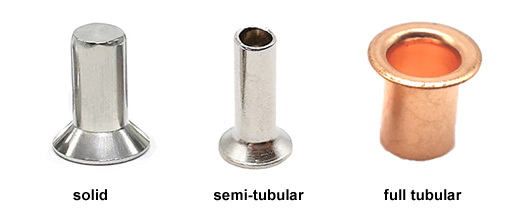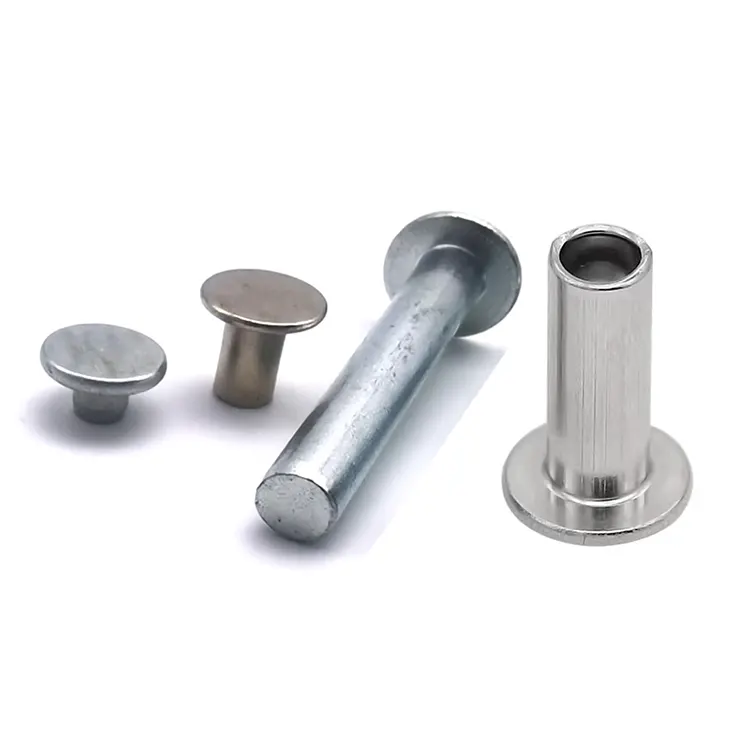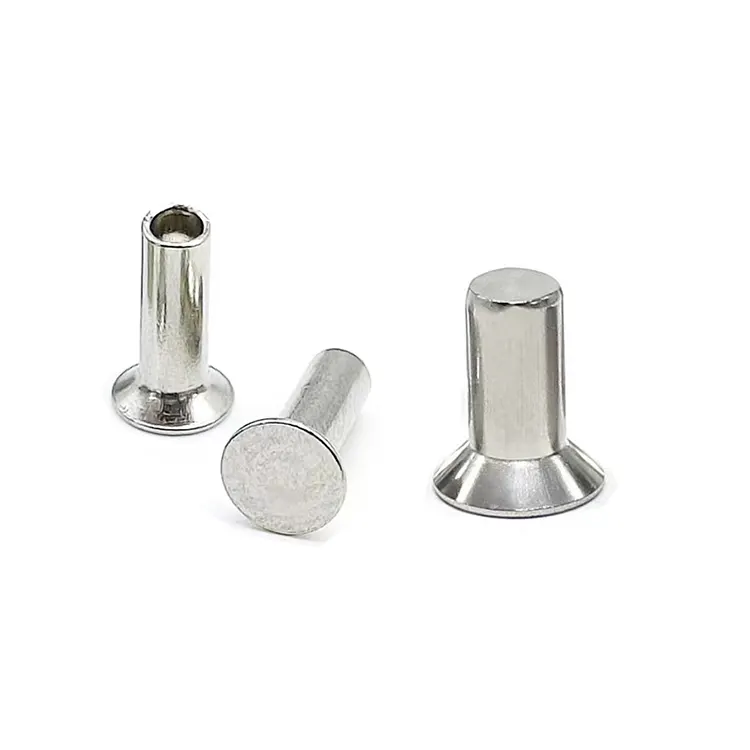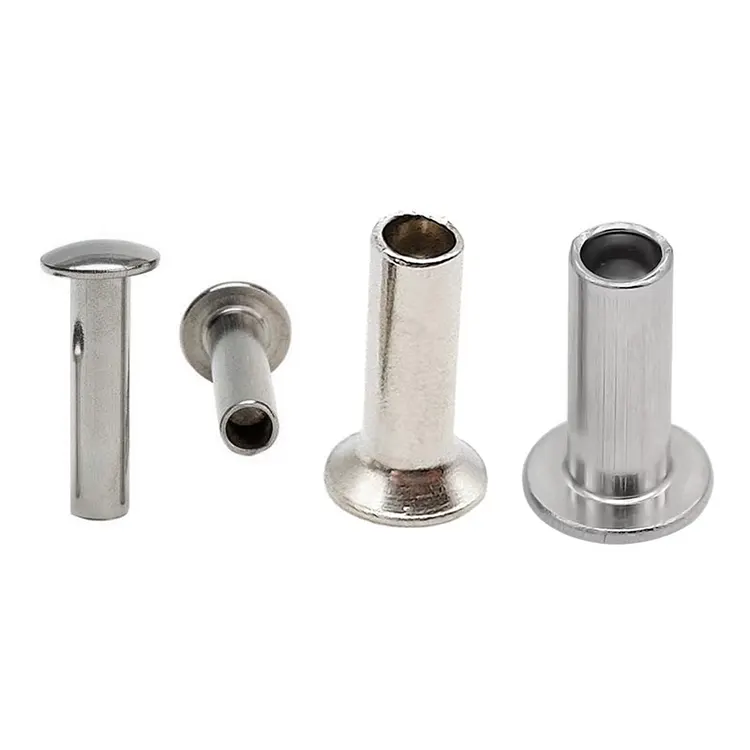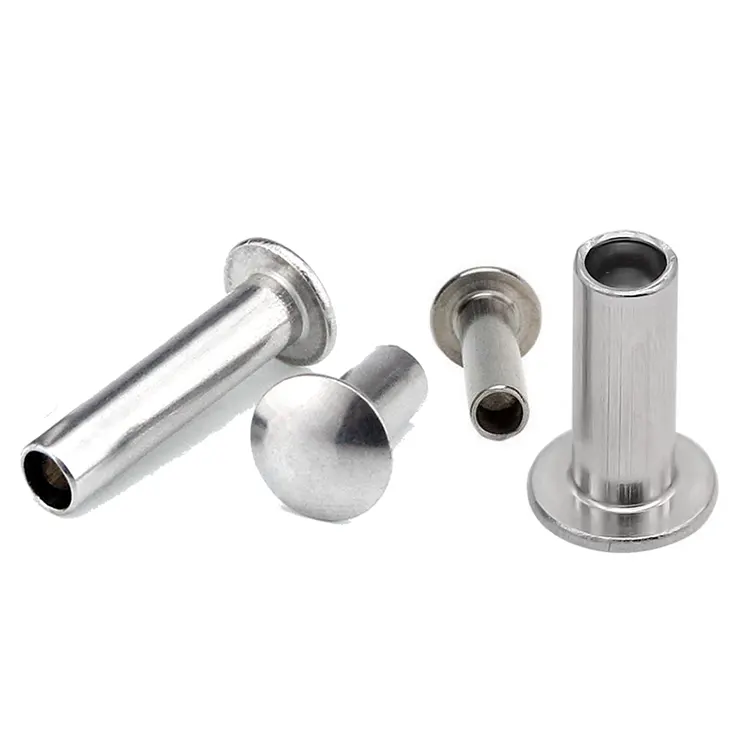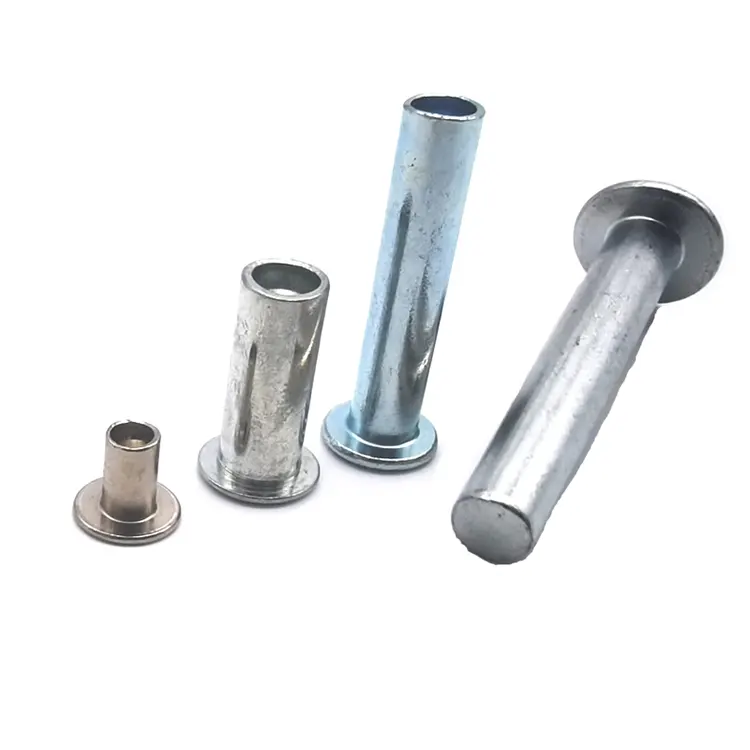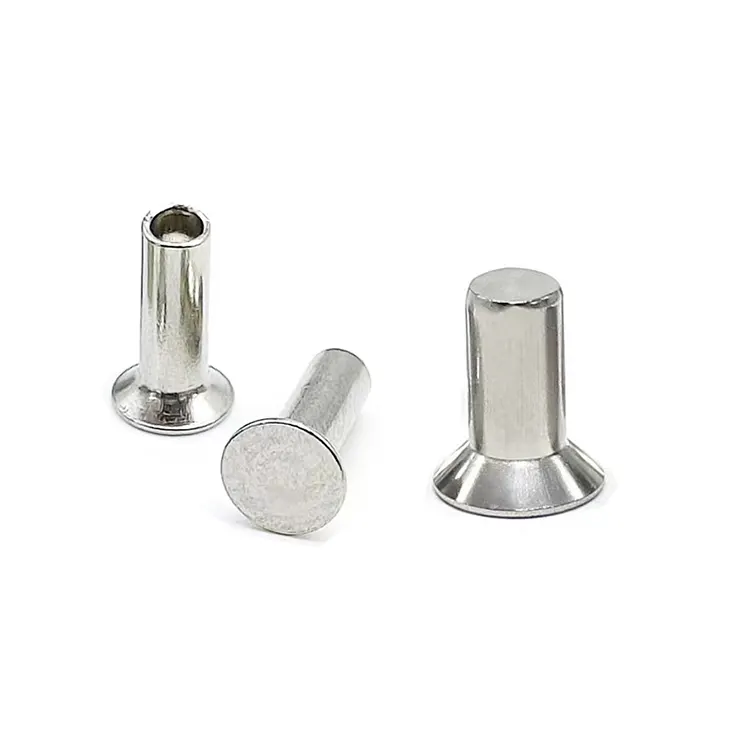Rivetti
As one of professional manufacturer in China, Notin would like to provide you Rivets. And we will offer you the best after-sale service and timely delivery.
What is a rivet?
A rivet is a permanent mechanical fastener used to join two or more materials. Rivets work by inserting a metal pin into an aligned hole and deforming the end, creating a strong, secure, and durable connection. Unlike temporary fasteners like screws, rivets do not rely on threads, but instead form a permanent connection, making them ideal for applications requiring high strength, durability, and vibration resistance.
Classification of Rivets
Rivets are typically categorized by head shape, degree of hollowness, or material.
Based on head shape, rivets can be classified as flat head rivets, round head rivets, countersunk head rivets, mushroom head rivets, universal head rivets, truss head rivets, etc.

Based on degree of hollowness, rivets can be classified as solid rivets, semi-tubular rivets, or full tubular rivets.
Based on material, rivets can be classified as brass rivets, stainless steel rivets, steel rivets, aluminum rivets, copper rivets, etc.
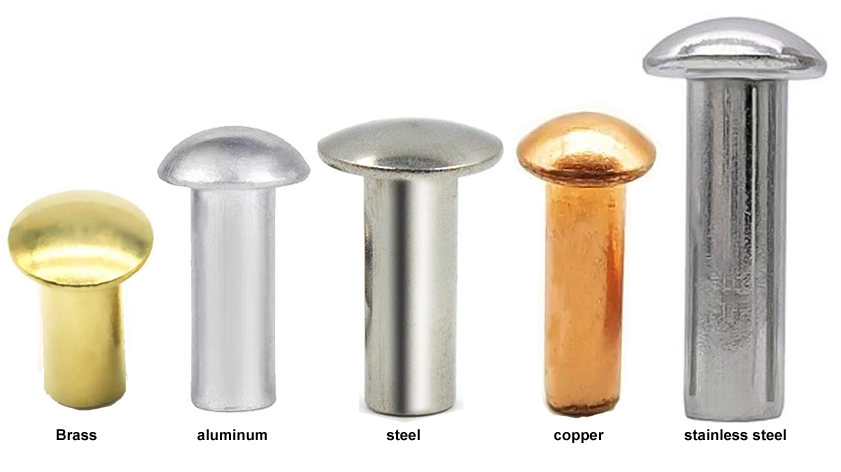
What surface finishes are available for rivets?
Rivet surfaces are typically treated with rust-proofing treatments, primarily electroplating, including zinc plating, nickel plating, chrome plating, tin plating, gold plating, and silver plating. Electroplating is a common rust-proofing method for rivets. It applies a layer of plating to the rivet surface through physical or chemical methods. The plating effectively prevents corrosion and rust, while also providing a certain aesthetic effect.
Another special surface treatment method is head coating. Head coating is performed after the rivet is electroplated. This allows for a variety of colors on the rivet head, achieving an aesthetically pleasing finish.
Aluminum rivets cannot be electroplated, but they can be anodized. Anodizing also allows for a variety of color options, but the unit price is higher than electroplating.
Rust-proofing the rivet surface is crucial, effectively extending the rivet's service life and ensuring a secure connection. Different rust-proofing methods are suitable for different environments and applications, so the choice should be tailored to the specific situation.
- View as
Rivetti a testa piatta in ferro
Essendo un comune connettore meccanico, i rivetti a testa piatta in ferro occupano una posizione importante in molteplici campi industriali grazie alle loro caratteristiche di progettazione e all'ampia gamma di applicazioni. Strutturalmente, la testa del rivetto è piatta, a forma di disco e il corpo è cilindrico. L'estremità viene appositamente lavorata per formare una struttura sconvolta. Dopo l'installazione, la pressione o l'impatto provocano l'espansione del corpo, formando un impegno meccanico con la parete del foro per ottenere un effetto di serraggio. Rispetto ai rivetti a testa tonda o ai rivetti a testa svasata, il design a testa piatta presenta vantaggi significativi nella distribuzione della forza e nell'area di contatto. Ad esempio, quando sottoposta a forza di taglio, la sua testa a forma di disco può disperdere il carico su un'area più ampia, riducendo efficacemente la pressione per unità di area.
Per saperne di piùInvia richiestaRivetti a testa svasata in ferro
La testa di un rivetto a testa svasata in ferro ha la forma di un tronco di cono, con il cono tipicamente inclinato di 90° o 120° rispetto all'asse del rivetto. Questa forma consente alla testa del rivetto di rimanere a filo con la superficie del componente collegato dopo l'installazione, ottenendo un aspetto liscio. Ciò è particolarmente adatto per applicazioni in cui la planarità della superficie è fondamentale. Vieni da Nuote Metals per personalizzare il tuo rivetto a testa svasata in ferro desiderato. I nostri ingegneri, con oltre 10 anni di esperienza, hanno una profonda familiarità con la produzione di vari tipi di rivetti.
Per saperne di piùInvia richiestaRivetti semitubolari
Un rivetto semitubolare è un elemento di fissaggio metallico solido a un'estremità e parzialmente cavo all'altra, solitamente realizzato con materiali come lega di alluminio, rame o acciaio. La porzione cava occupa circa da un terzo a metà della lunghezza del corpo del rivetto. Questo design consente al rivetto di ottenere un effetto di fissaggio attraverso la deformazione dell'estrusione durante l'installazione. Rispetto arivetti solidi, i rivetti semitubolari sono caratterizzati da leggerezza, facilità di installazione e ampia applicabilità; rispetto ai rivetti completamente cavi, forniscono maggiore resistenza e stabilità. I rivetti semitubolari non richiedono attrezzature complesse durante l'installazione e solitamente possono essere completati con utensili manuali o pneumatici. Pertanto, sono favoriti in molti campi. Nuote Metals è specializzata nella produzione di rivetti semitubolari, con una gamma completa di stampi e accoglie volentieri la personalizzazione.
Per saperne di piùInvia richiestaRivetti semicavi
Nuote Metals si trova a Dongguan, in Cina, siamo specializzati nella produzione di una varietà di rivetti, tra cuirivetti solidi, rivetti semitubolari, Erivetti tubolari pieni. I rivetti semicavi sono un comune elemento di fissaggio industriale, caratterizzato da una struttura ad anima cava con testa e gambo semi-chiusi. Questo design consente loro di combinare leggerezza ed elevata resistenza, rendendoli ampiamente utilizzati in applicazioni che richiedono una rivettatura efficiente. Rispetto ai rivetti pieni, i rivetti semicavi riducono il peso utilizzando meno materiale, sfruttando al tempo stesso la deformazione plastica durante la rivettatura per ottenere una connessione sicura, rendendoli particolarmente adatti per applicazioni sensibili al peso.
Per saperne di piùInvia richiestaRivetti a testa piatta
Nuote Metals è specializzata nella produzione di rivetti, producendo una varietà di materiali come acciaio inossidabile, ottone, alluminio, acciaio al carbonio e rame. I rivetti sono un elemento di fissaggio comune utilizzato in varie strutture e assemblaggi sia nella produzione industriale che nella vita di tutti i giorni. I rivetti a testa piatta sono il prodotto preferito da molti settori grazie alle loro prestazioni e adattabilità uniche.
Per saperne di piùInvia richiestaRivetti a testa svasata
I rivetti a testa svasata sono un dispositivo di fissaggio meccanico comune, utilizzato principalmente per applicazioni di fissaggio che richiedono elevata resistenza e una superficie liscia. Il design della testa svasata consente loro di rimanere a filo con la superficie del pezzo dopo l'installazione, eliminando eventuali sporgenze che potrebbero influire sull'aspetto o sulla funzione. I rivetti pieni svasati, invece, sono costruiti da un unico pezzo solido di materiale, senza sezioni cave. Vengono generalmente utilizzati per collegare professionalmente i pezzi mediante martellatura o rivettatura. È disponibile anche un rivetto semitubolare a testa svasata, con una sezione cava all'estremità per una rivettatura più semplice e meno laboriosa rispetto ai rivetti pieni.
Per saperne di piùInvia richiestaWhat are the advantages of rivets over other fasteners?
1. Ease of Installation
Rivets are fast to install, and even fully automated for high-volume applications, resulting in a simple and efficient operation process.
2. Connection Reliability
The riveting process is standardized, with strict quality control, resulting in highly stable connections. Visual inspection allows for quick verification of connection quality.
3. Vibration and Impact Resistance
Rivets connect through deformation or interference fit, providing strong clamping force and excellent vibration resistance, capable of withstanding vibration and shock.
4. Low Cost
Rivets are easy to install and can be fully automated, saving significant labor costs.
What are the advantages and disadvantages of rivets made of different materials?
Aluminum Rivets
Advantages: Lightweight, reduces overall product weight, low cost, suitable for general civilian applications.
Disadvantages: Low tensile and shear strength, unsuitable for high-strength workpieces, prone to electrochemical corrosion when in contact with metals such as stainless steel.
Stainless Steel Rivets
Advantages: Strong corrosion resistance, high hardness, suitable for high-strength workpieces (such as marine equipment)
Disadvantages: Higher cost, typically more expensive than aluminum rivets of the same specification.
Brass and Copper Rivets
Advantages: Excellent conductivity (such as connecting electronic components), good corrosion resistance.
Disadvantages: Higher cost, more difficult to process.
Steel Rivets
Advantages: High hardness, high connection reliability, and wide applicability.
Disadvantages: Compared to other materials, iron rivets are more prone to rusting.
What are the main applications of rivets?
Rivets have a wide range of uses, from small items like a pair of scissors to large items like airplanes and ships, as well as in high-precision medical applications.
Industrial Manufacturing
Rivets are used in a wide variety of industrial fields, wherever there is a need to connect two or more materials.
Electronics
Rivets secure heat sinks and chips, providing both vibration damping and noise reduction, and are widely used in the cooling systems of electronic products such as computers and mobile phones.
Automotive
Rivets are widely used to connect components of automobile bodies and chassis, such as doors and hoods. Their lightweight and corrosion-resistant properties make them an indispensable joining method in automotive manufacturing.
Aerospace
In aircraft manufacturing, rivets are used to connect different fuselage components, such as wings and tailplanes. Millions of rivets create high-strength, corrosion-resistant joints. Aluminum and titanium alloy rivets are often used to connect components of corresponding materials, ensuring stability in extreme environments.
Rivets are used everywhere. The above examples only represent a small number of their applications. We see rivets everywhere in our daily lives, such as on scissors, folding beds, and strollers etc. Rivets can be customized to different sizes and materials depending on the application.
Nuote Metals has specialized in the rivet industry for over a decade. Our factory is located in Dongguan, a city known as the "World Factory," a city with a developed industry and convenient transportation. This allows us to respond quickly when acquiring raw materials and supporting surface treatments, meeting our customers' needs for quick access to samples and bulk orders. We produce 10 million rivets daily and have molds of various specifications, allowing us to produce rivets as small as 0.8mm and as large as 10mm. We welcome your inquiries and visits.






